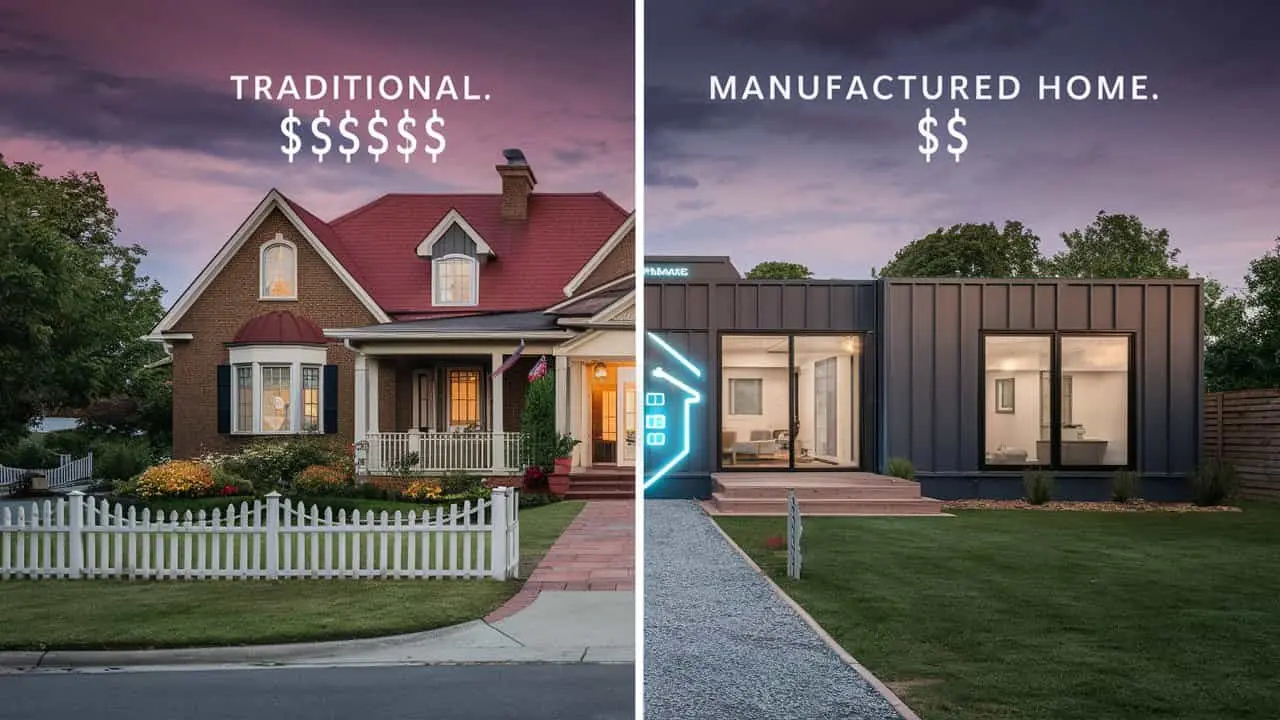Stop Renting, Start Owning: The Manufactured Home Advantage
Tired of throwing away money on rent? Dreaming of a place you can truly call your own? Manufactured homes offer a unique path to homeownership, unlocking a world of affordability, customization, and a faster move-in timeline.
Savings You Can Feel:
Manufactured homes are significantly cheaper than traditional stick-built houses. This is due to several factors, including:
- Factory Efficiency: Manufactured homes are built in a controlled environment, reducing labor costs and waste.
- Economies of Scale: Manufacturers purchase materials in bulk, leading to lower overall costs.
- Faster Construction: With shorter build times, you save on financing costs associated with traditional construction loans.
Owning a manufactured home allows you to invest in your future, building equity instead of lining a landlord’s pockets.
Your Style, Your Home:
Manufactured homes are no longer the boxy structures of the past. Today’s options offer a wide variety of styles and floor plans to suit your taste and needs. Whether you dream of a modern farmhouse, a cozy ranch, or a spacious double-wide, there’s a manufactured home that reflects your unique personality.
Move in Sooner, Start Living Faster:
Unlike traditional homes that can take months to complete, manufactured homes typically have much faster turnaround times. Since the home is built in a factory setting, weather delays and unforeseen construction issues are minimized. This means you can move into your dream home sooner and start building memories that last a lifetime.
Unlocking Savings: How Our Manufactured Home Loan Calculator Can Help
Let’s face it, understanding the true cost of manufactured home ownership can feel overwhelming. But fear not! Techvizmo’s free, user-friendly manufactured home loan calculator empowers you to take control of your finances and estimate your monthly payments with ease.
Know Your Numbers: Demystifying the Monthly Payment
Our calculator factors in three key variables to provide a clear picture of your potential monthly payment:
- Loan Amount: This is the total amount you borrow from a lender to finance your manufactured home purchase.
- Interest Rate: Expressed as a percentage, the interest rate reflects the cost of borrowing money over time. Generally, a lower interest rate translates to a lower monthly payment.
- Loan Term: This represents the length of your loan, typically measured in years (e.g., 15 years, 30 years). A longer loan term typically results in a lower monthly payment, but you’ll end up paying more interest overall.
By adjusting these variables in the calculator, you can explore different financing scenarios and find the payment option that best suits your budget.
Planning for Success: Calculating a Comfortable Down Payment
A down payment is a lump sum of money you pay upfront towards the purchase price of your manufactured home. While a larger down payment can reduce your loan amount and ultimately save you money on interest, it’s important to choose an amount that aligns with your financial situation.
Here are some tips for calculating a comfortable down payment:
- Consider your savings: Analyze your current savings to determine a realistic amount you can comfortably set aside for a down payment.
- Factor in other expenses: Don’t forget to account for closing costs and ongoing expenses like property taxes and insurance.
- Aim for long-term success: While a larger down payment can be beneficial, ensure it doesn’t deplete your emergency fund or hinder your ability to afford other financial goals.
Exploring Your Options: A Glimpse into Loan Types
While our calculator focuses on estimating your monthly payment, it’s important to understand the different loan options available for manufactured homes. Here’s a brief overview:
- FHA Loans: Backed by the Federal Housing Administration, FHA loans offer lower down payment requirements and are often easier to qualify for compared to conventional loans.
- VA Loans: Offered by the Department of Veterans Affairs, VA loans come with significant benefits for veterans and eligible service members, including potentially no down payment required.
- Conventional Loans: These traditional loans typically require a higher down payment and stricter credit score requirements. However, they may offer lower interest rates compared to FHA or VA loans.
Remember: This is just a high-level overview. We recommend consulting with a qualified mortgage lender to discuss the best loan option for your specific circumstances.
Using Techvizmo’s Manufactured Home Loan Calculator
Ready to unlock the potential savings of manufactured homeownership? Techvizmo’s user-friendly loan calculator takes the guesswork out of estimating your monthly payment. Follow these simple steps to navigate the features and gain valuable insights into your financing options.
Step-by-Step Guide:
- Enter Your Loan Amount: This is the total cost of your manufactured home, including the purchase price and any potential upgrades or add-ons.
- Set Your Interest Rate: You can either input an estimated interest rate you’ve received from a lender or use the industry average displayed on the calculator.
- Choose Your Loan Term: Select the desired length of your loan, typically ranging from 15 to 30 years. Remember, a longer-term translates to a lower monthly payment but higher overall interest costs.
- Click “Calculate”: Sit back and let the calculator work its magic!
Understanding the Inputs:
- Loan Amount: This represents the total amount you borrow from a lender to finance your manufactured home.
- Interest Rate: Expressed as a percentage, the interest rate reflects the cost of borrowing money over time. A lower interest rate translates to a lower monthly payment.
- Loan Term: This signifies the duration of your loan, typically measured in years (e.g., 15 years, 30 years). A longer loan term typically results in a lower monthly payment, but you’ll end up paying more interest overall.
Interpreting the Results:
The calculator will display two key figures:
- Estimated Monthly Payment: This reflects the amount you’d potentially pay each month towards your loan, including principal and interest.
- Total Loan Cost: This represents the total amount you’d pay over the life of the loan, including the principal amount borrowed and the cumulative interest charges.
Remember: The figures provided by the calculator are estimates. For a more accurate picture, consult with a qualified mortgage lender who can consider your specific financial situation and current interest rates.
Beyond the Calculator: Additional Considerations for Manufactured Home Loans
While Techvizmo’s calculator empowers you to estimate your monthly payment, manufactured homeownership involves additional factors to consider. Here’s a breakdown of some key aspects to factor into your decision-making process.
Understanding Ongoing Costs:
- Property Taxes: Just like traditional homes, manufactured homes are subject to property taxes levied by your local municipality. These taxes are typically based on the assessed value of your home and land (if applicable). Be sure to factor in this ongoing expense when budgeting for your manufactured home.
- Manufactured Home Insurance: Standard homeowner’s insurance may not cover manufactured homes. You’ll likely need a specialized Manufactured Homeowners Insurance (HO-7) policy to protect your investment from fire, theft, and other covered perils.
Land Ownership vs. Renting a Lot:
Manufactured homes can be placed on either owned land or rented lots within a manufactured home community. Each option presents unique financial considerations:
- Owning Land: This provides greater control and potential for appreciation in value. However, you’ll need to factor in the upfront cost of purchasing land and any associated property taxes.
- Renting a Lot: This offers a lower initial investment but comes with ongoing monthly lot rent payments. Be sure to understand the terms of the lease agreement, including any potential rent increases.
Qualifying for a Manufactured Home Loan:
Lenders have specific requirements for qualifying for a manufactured home loan. Here’s a general overview:
- Credit Score: A strong credit score (typically above 620) typically translates to a lower interest rate and better loan terms.
- Income: Lenders will assess your income and debt-to-income ratio to ensure you can comfortably afford the monthly payments.
- Down Payment: While some loan programs allow for lower down payments, a larger down payment can reduce your loan amount and potentially secure a more favorable interest rate.
Remember: These are just general guidelines. Specific requirements may vary depending on the lender and loan program. Consulting with a qualified mortgage lender experienced in manufactured home financing is crucial to understanding your eligibility and exploring your loan options.
Taking the Next Step: Turning Your Dream into Reality
Now that you’ve explored the financial landscape of manufactured homeownership, it’s time to take action! Here are some crucial steps to navigate your journey toward owning your dream home.
Pre-Qualification vs. Pre-Approval: Setting the Stage for Success
You might encounter the terms “pre-qualification” and “pre-approval” during your loan application process. While they sound similar, they hold distinct meanings:
- Pre-Qualification: This is a preliminary assessment by a lender based on the information you provide (income, debt, estimated credit score). It gives you a general idea of the loan amount you might qualify for, but it’s not a guarantee.
- Pre-Approval: This is a more formal step where the lender verifies your financial information through a credit check and reviews documentation like pay stubs and tax returns. A pre-approval letter signifies you’re a serious buyer and strengthens your offer when negotiating with sellers.
Pre-approval offers significant advantages:
- Stronger Negotiating Position: A pre-approval letter demonstrates to sellers that you’re a qualified buyer, making your offer more attractive.
- Streamlined Process: Pre-approval expedites the loan application process once you find your dream home.
- Confidence and Clarity: Knowing your pre-approved loan amount allows you to focus on homes within your budget and avoid potential disappointments.
Connecting with a Reputable Lender: Your Guide to Financing
Choosing the right lender is crucial for a smooth and successful manufactured home loan experience. Here are some tips for finding a reputable lender:
- Shop Around: Compare rates and terms offered by different lenders, including banks, credit unions, and specialized manufactured home lenders.
- Ask Questions: Don’t hesitate to inquire about fees, prepayment penalties, and any other aspects of the loan process.
- Seek Recommendations: Talk to friends, family, or real estate agents for referrals to lenders with a proven track record in manufactured home financing.
Frequently Asked Questions (FAQ)
Q: Do manufactured homes appreciate in value?
A: Unlike traditional stick-built homes, manufactured homes typically don’t appreciate in value at the same rate. However, they can still offer a stable and affordable housing option, especially considering their lower depreciation rates compared to other depreciating assets like vehicles. The land the home sits on, however, may appreciate in value over time, depending on market trends.
Q: Is it difficult to resell a manufactured home?
A: The resale market for manufactured homes can vary depending on location, home condition, and overall market demand. Generally, newer models and homes in desirable locations tend to sell faster and potentially at a higher price point. Proper maintenance also plays a key role in resale value.
Q: What financing options are available for manufactured homes?
A: Several financing options are available for manufactured homes, including:
- FHA Loans: Backed by the Federal Housing Administration, FHA loans offer lower down payment requirements and are often easier to qualify for compared to conventional loans.
- VA Loans: Offered by the Department of Veterans Affairs, VA loans come with significant benefits for veterans and eligible service members, including potentially no down payment required.
- Conventional Loans: These traditional loans typically require a higher down payment and stricter credit score requirements. However, they may offer lower interest rates compared to FHA or VA loans.
- USDA Loans: The United States Department of Agriculture (USDA) offers loan programs for manufactured homes located in rural areas.
Q: How long are most mobile home loans for?
A: The terms for mobile home loans (also known as manufactured home loans) can vary depending on the loan type and your qualifications. However, typical loan terms range from 15 to 30 years.
Here’s a breakdown of some common loan options and their associated terms:
- FHA Loans and VA Loans: These government-backed programs often allow for loan terms up to 30 years, especially if the manufactured home is permanently affixed to a foundation.
- Conventional Loans: Conventional loans for manufactured homes may offer terms similar to traditional home loans, typically ranging from 15 to 30 years depending on the lender and your creditworthiness.
- Chattel Loans: Used for non-permanently affixed homes situated in parks or on leased property, chattel loans tend to have shorter terms, usually ranging from 15 to 25 years. These loans often come with higher interest rates due to the increased risk for the lender.
Remember: When considering a loan term, it’s important to find a balance between affordability and overall loan cost. A longer-term will result in a lower monthly payment, but you’ll end up paying more interest in total. Discuss your options with a lender to determine the best loan term for your unique financial situation.
Q: How is home loan payment calculated?
A: Your monthly home loan payment is calculated based on three key factors:
- Loan Amount: This is the total amount you borrow from the lender to finance your manufactured home purchase.
- Interest Rate: Expressed as a percentage, the interest rate reflects the cost of borrowing money over time. A lower interest rate translates to a lower monthly payment.
- Loan Term: This represents the length of your loan, typically measured in years (e.g., 15 years, 30 years). A longer loan term typically results in a lower monthly payment, but you’ll end up paying more interest overall.
These factors are used in a loan payment formula to determine your monthly payment. While the exact calculation can involve complex financial functions, many online mortgage calculators, including Techvizmo’s, can estimate your monthly payment by simply inputting the loan amount, interest rate, and loan term.
Q: How do you calculate the maximum loan amount?
A: The maximum loan amount you qualify for depends on several factors, including:
- Credit Score: A higher credit score typically translates to a larger loan amount you can qualify for.
- Income and Debt-to-Income Ratio: Lenders will assess your income and existing debt to ensure you can comfortably afford the monthly payments. A higher income and lower debt-to-income ratio will allow you to qualify for a larger loan.
- Down Payment: A larger down payment reduces the amount you need to borrow and can potentially qualify you for a higher loan amount.
- Loan Program: Different loan programs have varying eligibility requirements and maximum loan amounts. For example, FHA loans may allow for a higher loan-to-value ratio (meaning you can borrow a larger portion of the home’s value) compared to a conventional loan.
Here’s the general idea: Lenders have guidelines for the maximum debt-to-income ratio they allow. By multiplying your gross monthly income by this ratio, you get a preliminary idea of the maximum monthly payment you can afford. This number, when divided by the estimated monthly payment based on different loan terms and interest rates, can give you a ballpark figure for the maximum loan amount you might qualify for.
Ready to Start Saving? Turn Your Dream of Manufactured Homeownership into Reality!
Now that you’re equipped with valuable information and a clear understanding of the financial landscape, it’s time to take action! Techvizmo is here to empower you on your journey toward manufactured homeownership.
1. Utilize Techvizmo’s Free Manufactured Home Loan Calculator:
Head back to the calculator and explore different loan scenarios. Estimate your monthly payment and see how much you can potentially save compared to traditional housing options.
2. Explore Financing Options:
Connect with a reputable manufactured home lender to discuss your loan options. Consider factors like interest rates, down payment requirements, and loan terms to find the program that best aligns with your financial goals.
3. Start Your Search:
With a clear understanding of your budget and financing options, you can confidently begin exploring manufactured homes that meet your needs and preferences.
Remember: Manufactured homeownership offers a unique path to achieving your dream of homeownership. By taking advantage of Techvizmo’s resources and partnering with a qualified lender, you can unlock significant savings and build a secure future in your very own manufactured home.
Related Articles:






One thought on “Save Thousands: Manufactured Home Loan Calculator”